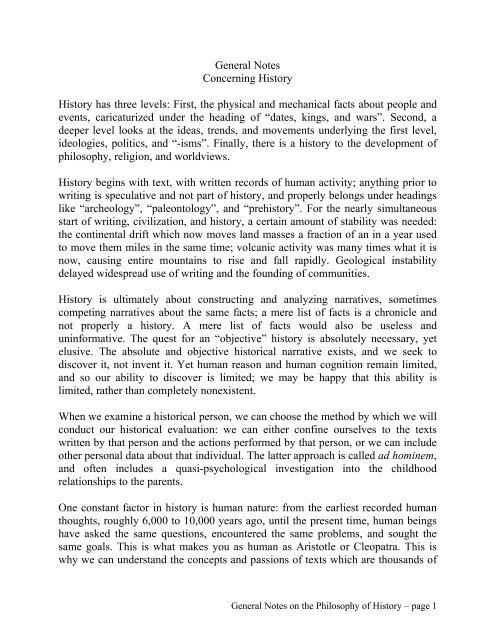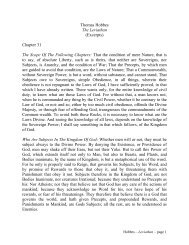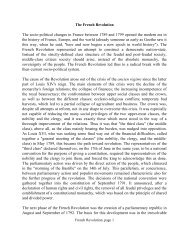General Notes about History
General Notes about History
General Notes about History
Create successful ePaper yourself
Turn your PDF publications into a flip-book with our unique Google optimized e-Paper software.
<strong>General</strong> <strong>Notes</strong><br />
Concerning <strong>History</strong><br />
<strong>History</strong> has three levels: First, the physical and mechanical facts <strong>about</strong> people and<br />
events, caricaturized under the heading of “dates, kings, and wars”. Second, a<br />
deeper level looks at the ideas, trends, and movements underlying the first level,<br />
ideologies, politics, and “-isms”. Finally, there is a history to the development of<br />
philosophy, religion, and worldviews.<br />
<strong>History</strong> begins with text, with written records of human activity; anything prior to<br />
writing is speculative and not part of history, and properly belongs under headings<br />
like “archeology”, “paleontology”, and “prehistory”. For the nearly simultaneous<br />
start of writing, civilization, and history, a certain amount of stability was needed:<br />
the continental drift which now moves land masses a fraction of an in a year used<br />
to move them miles in the same time; volcanic activity was many times what it is<br />
now, causing entire mountains to rise and fall rapidly. Geological instability<br />
delayed widespread use of writing and the founding of communities.<br />
<strong>History</strong> is ultimately <strong>about</strong> constructing and analyzing narratives, sometimes<br />
competing narratives <strong>about</strong> the same facts; a mere list of facts is a chronicle and<br />
not properly a history. A mere list of facts would also be useless and<br />
uninformative. The quest for an “objective” history is absolutely necessary, yet<br />
elusive. The absolute and objective historical narrative exists, and we seek to<br />
discover it, not invent it. Yet human reason and human cognition remain limited,<br />
and so our ability to discover is limited; we may be happy that this ability is<br />
limited, rather than completely nonexistent.<br />
When we examine a historical person, we can choose the method by which we will<br />
conduct our historical evaluation: we can either confine ourselves to the texts<br />
written by that person and the actions performed by that person, or we can include<br />
other personal data <strong>about</strong> that individual. The latter approach is called ad hominem,<br />
and often includes a quasi-psychological investigation into the childhood<br />
relationships to the parents.<br />
One constant factor in history is human nature: from the earliest recorded human<br />
thoughts, roughly 6,000 to 10,000 years ago, until the present time, human beings<br />
have asked the same questions, encountered the same problems, and sought the<br />
same goals. This is what makes you as human as Aristotle or Cleopatra. This is<br />
why we can understand the concepts and passions of texts which are thousands of<br />
<strong>General</strong> <strong>Notes</strong> on the Philosophy of <strong>History</strong> – page 1
years old: because the authors shared the same unchanging human nature which we<br />
all have.<br />
Partly because we all share this same human nature, and perhaps partly for other<br />
reasons, there are “eternal questions” which recur throughout history. Historians<br />
disagree on exactly how many “eternal questions” there are, but here’s an example<br />
of what three of them might be:<br />
• How can I escape my “subjective bubble” (my ideas, perceptions, and<br />
opinions) and obtain objective knowledge?<br />
• Does God love me or hate me, and why?<br />
• How should a community or society be organized? How should society<br />
and government interact?<br />
There are many other candidates for “eternal questions”. Suggest some.<br />
It becomes necessary to clearly and rigorously define some words: “history”,<br />
“religion”, and “philosophy”.<br />
The role of religion in civilization and history is both significant and obvious. The<br />
emergence of religion from early, non-religious phases of civilization is not so<br />
obvious.<br />
Early civilization embraces myth, magic, and manipulation, and lacked religion.<br />
Myth explained; magic and manipulation were attempts to control the forces of<br />
nature, obtain fertility, and ensure military victories. This type of polytheistic<br />
paganism prescribes some ritual or sacrifice designed to persuade a deity to deliver<br />
the goods.<br />
Religion concerns relationships: the individual’s relation to God, and to other<br />
humans. A religion has a text and a founder. Religion is an attempt to bridge the<br />
gap between the perfect/infinite deity and the imperfect/finite human. Religion is<br />
personal, inasmuch as it treats both the human and the deity as person, i.e., having<br />
beliefs, desires, emotions, and agency. Religion is not private, inasmuch as it<br />
encompasses visions of society. A religion is related to a way of life; it has various<br />
forms in different times and places; it can be related to geography.<br />
<strong>General</strong> <strong>Notes</strong> on the Philosophy of <strong>History</strong> – page 2
Religion is NOT ethics and morals, is NOT traditions, rules, culture, opinions,<br />
beliefs.<br />
Three cornerstones of civilization, as it emerged in the ancient world: (1) the<br />
alphabet replaces other symbolic forms, (2) monogamy is valued, (3) human<br />
sacrifice is gradually phased out.<br />
Another recurring theme in history is the tension between centralized and<br />
decentralized forms of government. From Persia to Rome, from Alexander the<br />
Great to the Holy Roman Empire, this will be a consideration; feudalism, often<br />
derided as an archaic system, proves to be, in this light, a champion of local<br />
independence and of decentralization. It is also no accident that the series of “Star<br />
Wars” films by George Lucas echoes the events of Roman history.<br />
As we look at historical texts, we will need to be alert to issues of translation and<br />
transliteration.<br />
Maps are also an important part of studying history.<br />
There are different ways to look at historical change: it might be an organic<br />
process, working its way gradually through societies and populations in the<br />
attitudes and decisions of the average person, or it might be the decisive choice of<br />
one man at a crucial moment. <strong>History</strong> is either a series of historical choices by<br />
great men at decisive moments, or it can be told as a gradual process of growth and<br />
change in slow waves and trends through entire communities, cultures, and<br />
civilizations.<br />
Population and Economics: the pattern seems to be that a steadily growing<br />
population is the best circumstance for economic prosperity and stability, as well<br />
as political tranquility. If the population grows too quickly, too slowly, or<br />
erratically (i.e., the annual rate varies too much from one year to the next), or if the<br />
population does not grow at all, or even shrinks, then economic hardship is<br />
inevitable. This pattern is relevant to events both in the Roman Republic and the<br />
Roman Empire. It is relevant also to the study of Thomas Malthus, whose brilliant,<br />
but sadly mistaken, views have been overturned the discovery of the fact that our<br />
planet has always produced more food than was needed by the humans living on it,<br />
and that all hunger and starvation has been unnecessary, and the result of human<br />
incompetence or greed.<br />
<strong>General</strong> <strong>Notes</strong> on the Philosophy of <strong>History</strong> – page 3
Since the time of Moses, we see that the majority trend within “western” or “Eurocentric”<br />
civilization has held a certain “sympathy for the underdog”, a tendency to<br />
consider, and act in, the interests of those who are most vulnerable in society.<br />
Notable exceptions, of course, exist, in the persons of Nietzsche, Hitler, and Stalin.<br />
But general trend has held, and perhaps even gained in predominance, over time.<br />
This strength, however, of our civilization has also recently become a weakness,<br />
because those who wish to gain power by claiming to be victims can exploit this<br />
sentiment. It has now become necessary to distinguish between those who are at<br />
the bottom of societal structures and those who merely claim “victim status” as a<br />
path to political power. In non-western, or non-Eurocentric societies, this path to<br />
power is not open.<br />
The events of history take place within the framework of time, space, matter, and<br />
energy. Another way of saying this is that the events of history involve elements<br />
that are, at least in principal, directly or indirectly detectable by the five senses. We<br />
need to be aware that these are the minority of events. The majority of events are<br />
composed of elements that lie outside of space and time, which are therefore not<br />
composed of matter or energy, and not detectable to the five senses. Strictly<br />
speaking, history does not concern itself with such things. Practically, however, we<br />
will concern ourselves with them to some extent, when we consider the history of<br />
philosophy and the history of religion. We need to be aware, then, that we have, at<br />
that point, left behind history, narrowly defined, and entered a separate field of<br />
study.<br />
Given that text is central to historical study, issues of language will interface; at a<br />
minimum, we will need to continuously acknowledge that we are dealing with<br />
texts that are either translated into our language, or written in an older form of our<br />
language. Philology is relevant to history.<br />
<strong>General</strong> <strong>Notes</strong> on the Philosophy of <strong>History</strong> – page 4















